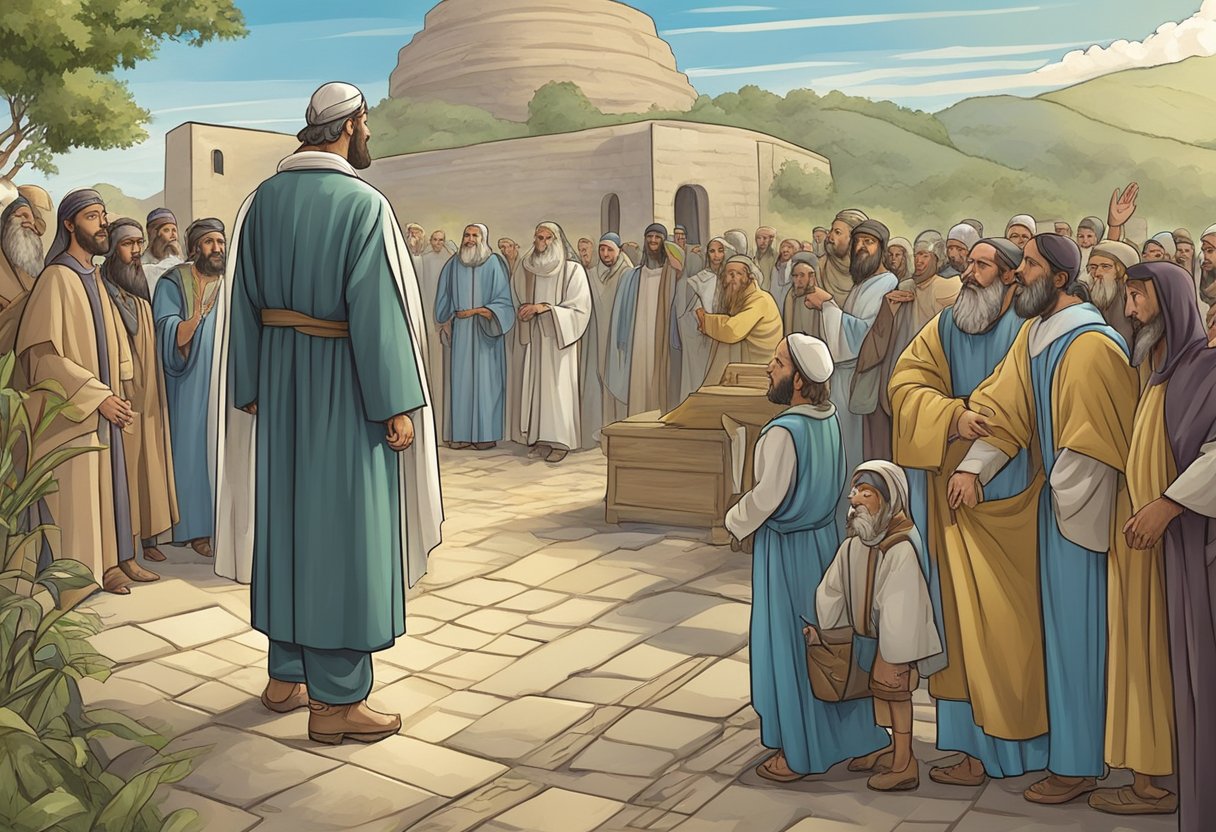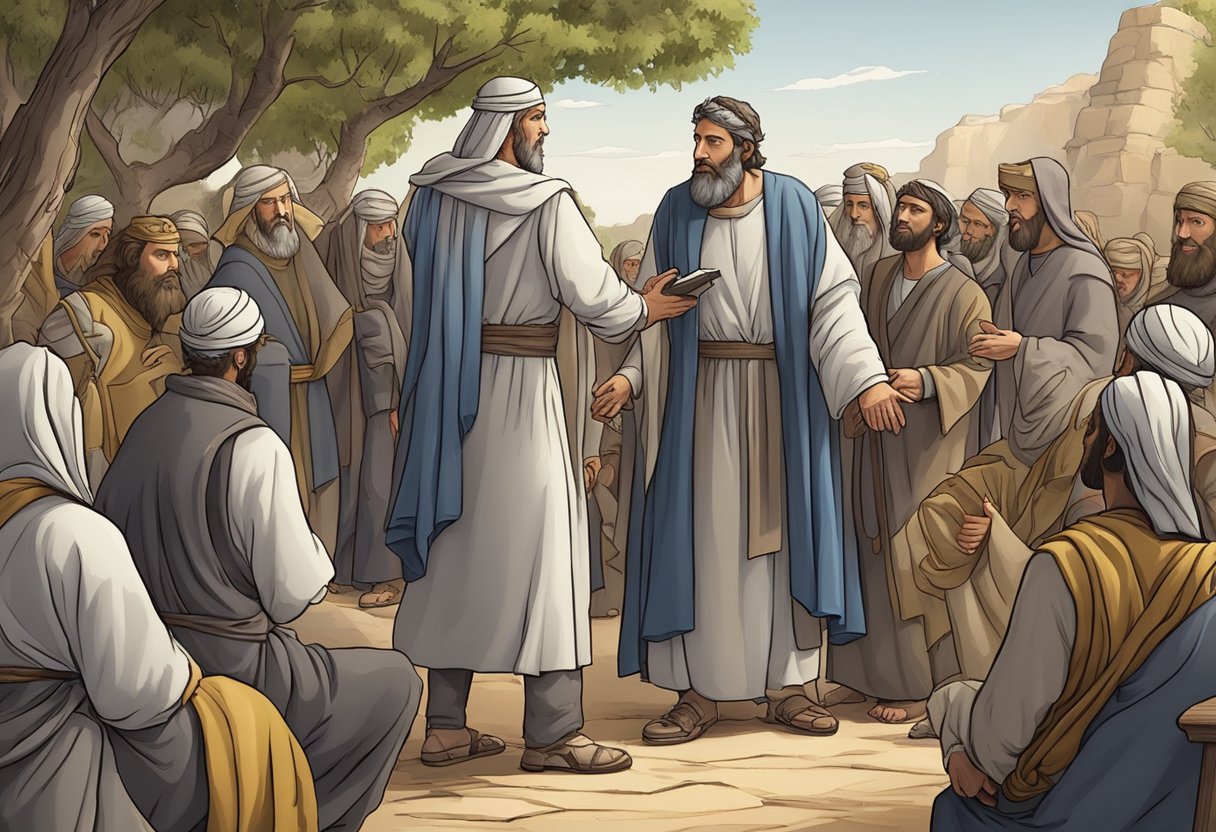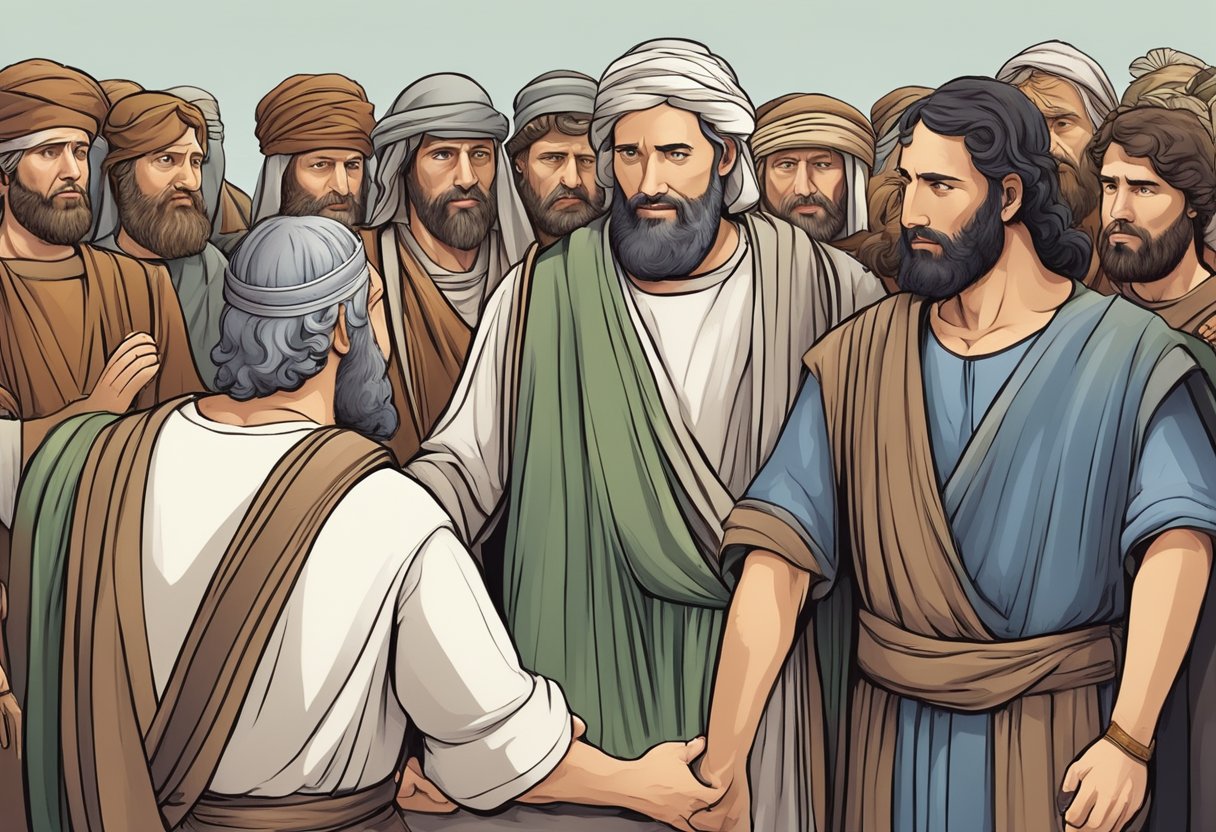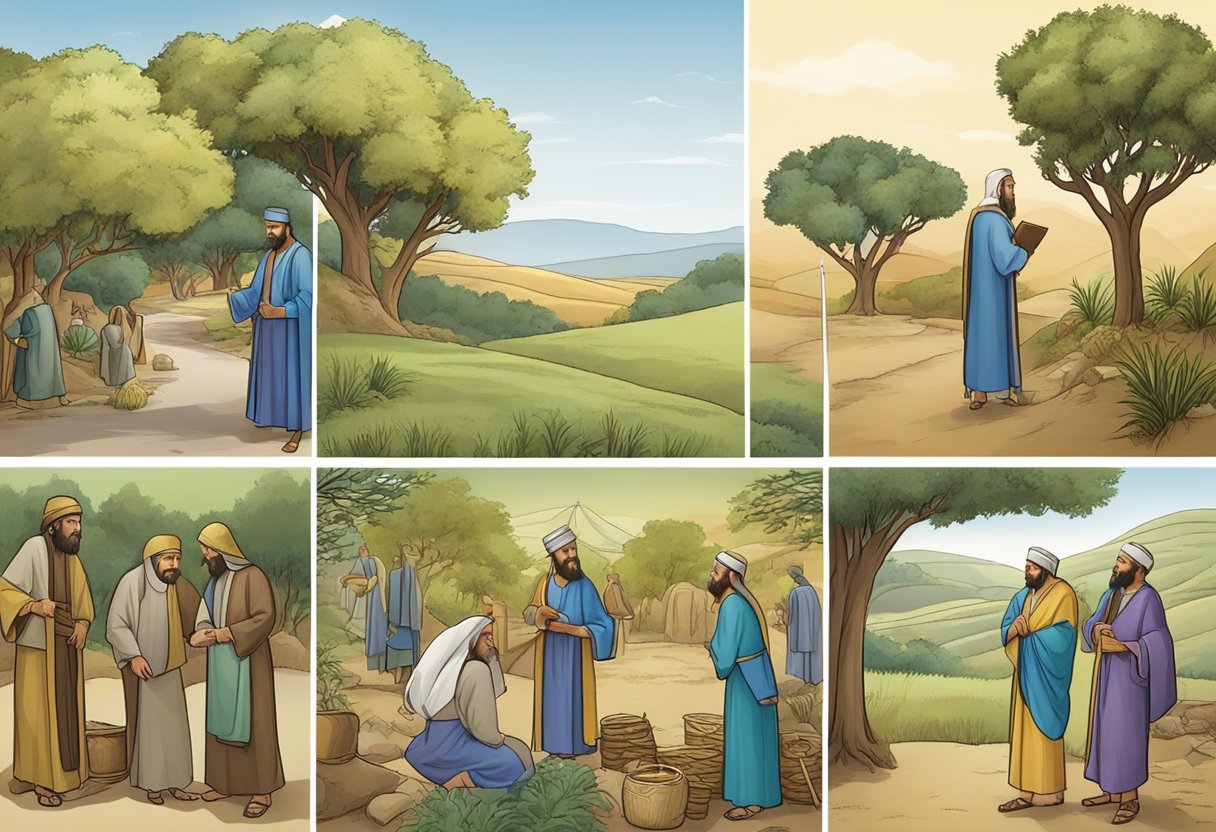Who was Job in the Bible – Job is a central figure in the Hebrew Bible, known for his unwavering faith and resilience in the face of immense suffering. Often considered a prophet, Job’s story is found in the Book of Job, a part of both the Masoretic Text and the Septuagint. The Book of Job explores complex themes of human suffering, the nature of God, and the relationship between God and humanity.

The story revolves around Job, a wealthy man who is described as “blameless” and “God-fearing.” When the Adversary (commonly identified as Satan) challenges Job’s faith, claiming that he is devoted to God only because of his wealth and prosperity, God allows Job to be tested. The Book of Job then recounts the tragic events that befall Job, including the deaths of his family members and the loss of his wealth, as well as the intervention of his friends who debate the meaning and purpose of his suffering.
Table of Contents
Who was Job in the Bible
Here is a set of bullet points about Job in the Bible:
- Job was a man who lived in the land of Uz. The Bible describes him as blameless, upright, fearing God, and turning away from evil.
- Job was extremely wealthy, with thousands of animals and servants. He had 7 sons and 3 daughters.
- God holds up Job as an example of a righteous man to Satan. Satan argues that Job only worships God because of the blessings God has given him.
- God allows Satan to take away all of Job’s possessions, kill his children, and afflict Job with painful boils from head to toe. However, Job remains faithful to God.
- Job’s wife tells him to curse God and die, but Job refuses. He sits in ashes and laments his fate but does not curse God.
- Three of Job’s friends – Eliphaz, Bildad, and Zophar – come to comfort him but end up accusing him of hidden sins to explain his suffering. Job maintains his innocence.
- Elihu, a younger man, speaks up and says that God may bring suffering to turn man from wrongdoing.
- God then speaks to Job out of a whirlwind, questioning Job about his understanding of divine justice and wisdom.
- In the end, God restores Job’s fortunes and family. He condemns the false arguments of Job’s friends. Job repents in dust and ashes.
Despite the severe challenges he faces, Job maintains his integrity and faith in God, engaging in further dialogues on the nature of God’s justice and the existence of suffering. Ultimately, Job is restored to his former prosperity, paving the way for readers to derive valuable lessons and insights from his life.
Key Takeaways
- Job is a God-fearing figure in the Hebrew Bible, renowned for his endurance amid immense suffering.
- The Book of Job delves into themes of human suffering, God’s nature, and the relationship between God and mankind.
- Job’s unyielding faith, despite severe trials, provides powerful lessons and insights for those who read his story.
Job and His Background

Job was a well-known character in the Bible, primarily mentioned in the Book of Job. He was a resident of the land of Uz and was considered the greatest man among his people. He was blessed with significant wealth, making him a prosperous and respected figure.
Job had a large family, which included seven sons and three daughters. They enjoyed a close-knit relationship and regularly gathered for feasting together, particularly during their birthdays. This demonstrates that Job was a loving father and maintained a good relationship with his children.
Although Job wasn’t an Israelite, his faith in God and exemplary character won him great favor. Amidst his success and fortunate life, he never lost sight of the importance of his faith. He consistently demonstrated righteousness and compassion, setting an excellent example for those around him.
Job’s wealth and fortune were demonstrated through his ownership of livestock, which included thousands of sheep, camels, oxen, and donkeys. This symbolized his status as a successful and rich man in his society. His material wealth, however, never clouded his devotion and piety.
In summary, Job was a prosperous and prominent figure in the Bible, well-known for his deep faith and righteousness. He balanced his impressive success with humility and maintained a strong connection to God and his family.
Job’s Relationship with God
The biblical figure of Job is often described as a blameless and upright man. His story, as detailed in the Book of Job, highlights the relationship between a mortal and their deity, typified by Job’s deep spirituality and hope. Living a devout life, Job was known for fearing God and avoiding evil, which brought about various blessings upon his life.
Throughout the narrative, it becomes evident that Job’s relationship with God revolves around trust and faith. Despite suffering great misfortunes and agonizing trials, he remains steadfast in his loyalty to God, refusing to curse or blame the divine. Consequently, his unwavering faith is eventually rewarded, as God restores Job’s fortunes and blesses him with even greater prosperity than before.
Job’s story demonstrates that a genuine fear of God stems not from superficial obedience but from an intimate relationship with the Lord. This connection enables an individual to retain their faith and hope in the face of adversities, trusting that God will ultimately carry them through. In The Book of Job, we see a unique perspective on the divine-human relationship that transcends a traditional, reward-punishment narrative.
In conclusion, the Book of Job tells the story of a man whose devotion to God transcended his personal struggles. His fear of God and upright nature allowed him to maintain an unwavering belief, despite the immense challenges he faced. Job’s relationship with God serves as an example for all, as it showcases the value of faith, hope, and steadfast loyalty in establishing a profound spiritual connection with one’s deity.
The Adversary’s Challenge

In the Book of Job, the Biblical character Job is a wealthy and righteous man who faces a series of devastating misfortunes. This narrative arises from a celestial encounter between God and Satan, known as the Adversary in the Hebrew Bible. The story of Job begins with a description of his piety, wealth, and large family. He is said to be “blameless” and “upright,” consistently praising and worshipping God even in the face of adversity.
The Adversary’s challenge commences when God addresses Satan, who had been roaming the earth, inquiring about Job’s unwavering faith. However, Satan counters God’s praise by asserting that Job is faithful only because he is protected and enjoys a prosperous life. He further alleges that Job would quickly curse God should he lose everything he possesses. Intrigued by the Adversary’s claim, God allows Satan to test Job’s faith by granting him power over all of Job’s earthly possessions, barring direct harm to Job himself.
Here is a table showing some ways Satan tests men according to the Bible:
| Test | Person | Verse | Lesson |
|---|---|---|---|
| Temptation in the wilderness | Jesus | Matthew 4:1-11 | Resist temptation through Scripture |
| Discouragement | Elijah | 1 Kings 19:1-18 | Don’t lose heart even in difficult times |
| Pride | Nebuchadnezzar | Daniel 4:28-33 | Remain humble and give God glory |
| Greed | Judas | Matthew 26:14-16 | Don’t be led astray by money or things |
| Doubt | Thomas | John 20:24-29 | Have faith even without seeing |
| Lust | David | 2 Samuel 11:1-5 | Flee sexual immorality |
| Envy | Cain | Genesis 4:1-8 | Don’t be jealous of others’ blessings |
This covers some of the main ways Satan tests or tempts people according to biblical accounts: through temptation, discouragement, pride, greed, doubt, lust and envy. Each person/story provides a lesson on how to resist or overcome those tests or temptations.
As the testing unfolds, Satan destroys Job’s possessions, kills his children, and afflicts him with painful sores. Nevertheless, Job maintains his faith in God, neither blaming nor cursing him for his woes. In the midst of his tribulations, Job is visited by three friends who attempt to comfort and console him. Throughout their discourse, they propose various theories for his suffering, often insinuating that Job must have committed some sin to invite such calamities.
Despite the mounting challenges, Job refuses to relinquish his unwavering belief in God’s justice. As the story unfolds, the dramatic cosmic wager between God and Satan unfolds, with Job’s faith being severely tested. Through this narrative, the Book of Job presents a complex exploration of faith, adversity, and human suffering.
In conclusion, the Adversary’s challenge in the Book of Job serves as a powerful symbol of the cosmic struggle between good and evil, testing the limits of human faith and resilience. Throughout the narrative, Job’s unwavering devotion to God, even when confronted with unimaginable suffering, demonstrates the strength of the human spirit and the profound depths of faith.
Job’s Suffering
Job was a wealthy and righteous man living in the land of Uz, admired for his prosperity and piety. The Bible tells the story of how he suddenly faced numerous catastrophes, testing his faith and perseverance.
God considered Job to be a faithful servant, boasting about his righteousness. Satan, however, challenged Job’s faith, arguing that his loyalty to God was due to his abundant wealth and blessings. To prove the sincerity of Job’s devotion, God permitted Satan to take away his possessions and children.
In a series of tragic events, Job experienced the loss of his livestock and servants. Sabeans and Chaldeans attacked his herds of oxen, donkeys, and camels, killing his servants in the process. In a natural disaster, a powerful wind from the east struck the house where Job’s children were gathered, causing it to collapse and kill them all.
Despite these devastating losses, Job maintained his faith and integrity. He did not blame or charge God with wrongdoing, but instead mourned for his misfortunes.
Amidst his suffering, Job was visited by three friends – Eliphaz, Bildad, and Zophar. They attempted to comfort him and uncover the reason behind his affliction. They suggested that Job’s suffering must be punishment for some sins or transgressions. Job, however, maintained his innocence and expressed his desire to question God about the reason for his suffering.
In response to his plea, God’s voice came from a whirlwind, emphasizing his omnipotence and control over the earth, wind, and other natural elements. It illustrated the mystery and complexity of creation and the divine wisdom that surpasses human understanding.
Although Job could not comprehend the full nature of his suffering, he remained firm in his faith and trust in God. his story serves as a testament to the power of perseverance and the importance of maintaining faith in the face of seemingly insurmountable adversity.
Testing Job’s Integrity
Job, a prominent figure in the Hebrew Bible, was known for his remarkable integrity and faithfulness. He endured much suffering and adversity in his life but remained steadfast in his allegiance to God. This section will explore the key events and aspects of Job’s trials, supernatural tests, and the evident demonstration of his unwavering integrity.
The Book of Job showcases an unusual conversation between God and Satan, where Satan argues that Job’s piety is a result of his prosperity and protection. To prove Job’s genuine faith, God allows Satan to put Job to the test by inflicting various hardships on him, while maintaining a strict condition that Job’s life must be spared. This divine test serves as a cornerstone of the story, highlighting Job’s unwavering faith and integrity.
Throughout the trials, Job faced immense suffering, including the loss of his possessions, children, and health. However, through it all, Job refused to succumb to the challenges and consistently “shunned evil.” His wife advised him to “curse God and die,” but Job maintained his faith and responded with the famous words, “Naked I came from my mother’s womb, and naked shall I return” (Job 1:21).
As his suffering progressed, Job was covered in painful sores and was left alone to sit in ashes. Not even his friends could offer him any consolation; instead, they accused him of some hidden wrongdoing to justify the divine punishment. Job asserted his innocence and continually praised God, showcasing his unwavering integrity. His steadfastness in the face of adversity demonstrated that his faith was not contingent upon his worldly possessions or fortunes.
Although Job’s friends criticized him, he held onto his faith and maintained his belief in God’s righteousness. He wore his heartache like a garment or a robe and refused to relinquish it, despite his desperate situation. With profound conviction, Job eventually confronts and challenges God, demanding an explanation for his suffering.
In the end, God responded to Job’s inquiries, highlighting his limited human understanding. Through an awe-inspiring conversation, God restored Job’s fortunes and blessed him with an even greater abundance than he possessed before. Job’s unwavering commitment to his faith and integrity throughout the narrative exemplifies his exceptional character and serves as a testament to the power of maintaining steadfastness in times of trial and adversity.
The Deaths of Job’s Family
Job, a wealthy and righteous man in the Bible, faced an immense tragedy when his family and possessions were taken away from him. This heart-wrenching event unfolded in a series of devastating events, primarily instigated by Satan to test Job’s faithfulness.
Job’s sons and daughters were enjoying a meal together in the eldest brother’s house when a great disaster occurred. A mighty wind, most likely a tornado, swept across the land, causing the four corners of the house to collapse. The debris led to the deaths of all of his children, who were buried under the rubble. Simultaneously, another tragedy befell Job’s servants and his household.
There had been a raid by the Sabeans, who killed his servants and stole his oxen and donkeys. A second group, the Chaldeans, attacked his camels and killed the camel herders using the sword to strike them down. These events left Job with almost nothing, as he lost his wealth and his family in a short span of time.
Despite these overwhelming losses, Job remained faithful to God, grieving for his family and expressing his trust in the divine plan. The story of Job’s dead family and the loss of his servants and wealth serves as a lesson about human suffering and the ultimate triumph of faith.
This tragic tale involving the household of Job highlights the vulnerability of human life and the trials that even the most devout believers may face. It continues to serve as a reminder that faith, resilience, and devotion to God can lead to eventual restoration and blessings in spite of the hardships encountered.
The Intervention of Job’s Friends
The story of Job in the Bible is a complex tale of a man’s faith and resilience in the face of immense suffering. Central to the narrative are Job’s friends, who try to comfort him during his trials. These friends, Eliphaz the Temanite, Bildad the Shuhite, and Zophar the Naamathite, play a crucial role in trying to provide Job with wisdom and understanding in the midst of his turmoil.
When they first arrive, they are shocked by the extent of Job’s affliction and weep with him, sitting in silence for seven days. They genuinely attempt to comfort their friend by discussing the nature of his plight and its potential causes. They draw on their wisdom and personal experiences to make sense of Job’s suffering, which is evident in their speeches throughout the dialogue.
Eliphaz, the eldest among the friends, takes the lead in speaking, emphasizing that Job must have committed some sin to deserve this punishment from God. Bildad and Zophar echo similar sentiments, focusing on the notion that the wicked are punished and the righteous prosper. They all try to impress upon Job the need for repentance in order to regain favor with God.
However, their attempts at comfort inadvertently push Job deeper into despair. They fail to recognize that Job is already questioning and seeking understanding from God, and their constant assertions of his guilt only add to his anguish. Their well-meaning interventions thus highlight the limits of human wisdom and understanding in dealing with inexplicable suffering.
Despite the conflict between Job and his friends, they remain by his side throughout his ordeal, showing their loyalty to him. Towards the end of the narrative, God rebukes them for not speaking accurately about his intentions. In response, the friends humbly accept the criticism and offer sacrifices to regain God’s favor, mediated through Job’s prayers.
Through the intervention of Job’s friends – Eliphaz, Bildad, and Zophar – the narrative demonstrates the importance of seeking wisdom and understanding even in the darkest of times, while highlighting the complexities and limitations of human wisdom when faced with suffering. Their presence serves as a reminder that genuine friendship and support can be pillars of strength, even if they falter at times in their attempts to provide solace.
Further Challenges and Dialogues

The story of Job in the Bible tells the tale of a prosperous and righteous man who endures severe suffering to test his faith. Throughout the Book of Job, various dialogues and challenges, involving Job, his friends, and divine interlocutors such as the Almighty and a young man named Elihu, contribute to the narrative’s depth.
One of the characters that play a key role in these dialogues is Elihu. He is a young man who becomes involved in a debate with Job and his friends. Elihu takes a different approach than Job’s three friends, emphasizing that God speaks to human beings through their experiences, including suffering. It is noteworthy that when God appears to speak to Job in the whirlwind, Elihu is not rebuked, unlike Job’s friends.
The whirlwind appearance of God is a significant part of the Book of Job, as it marks a change in the conversation. God speaks of creation, contrasting the wonders of the universe with the limited understanding of human beings. He challenges Job’s insistence that he has been unfairly treated and ultimately restores Job’s fortunes to him.
Job’s suffering throughout the book leads him to question and even accuse God of wrongdoing. In response, God points to his role in establishing order in the world, creating boundaries, and maintaining balance. This dialogue and the subsequent restoration of Job’s fortunes emphasize the importance of faith and trust in God’s wisdom and justice.
In his anguish, Job expresses hope for a redeemer who would stand up on his behalf. This longing for a mediator reinforces the theme of faith throughout the story. By expressing this hope, Job demonstrates his belief in an ultimate resolution to his suffering and despair.
Throughout the Book of Job, the challenges and dialogues serve to highlight the complexities of faith, righteousness, and human understanding. While Job loses everything, including his family and livelihood, he stays strong by maintaining his relationship with God. Ultimately, Job learns from his challenges and realizes that faith and righteousness extend beyond material possessions. Despite his despair, Job finds solace in the knowledge that God’s wisdom is beyond human comprehension and that remaining faithful would lead to the restoration of his life.
Job’s Restoration
Job was a biblical figure who lived in the land of Uz, believed to be a descendant of the Edomite people. He was known as an affluent individual with vast livestock and land, and he was highly respected among his peers due to his strong moral character and devout obedience to God. Job’s story takes a dramatic turn when raiding parties attacked his property, and God allowed various calamities to befall him.
One of the most significant tragedies in Job’s life was the loss of his property and children. While his livestock was either burned up by the fire of God or stolen by raiding parties, his children were tragically killed in a natural disaster. In the midst of his misfortunes, his body was covered in painful sores, making his suffering even more intense. Job wondered why he was facing such a difficult time despite his unwavering devotion to God.
Throughout the ordeal, Job continued to cling to his faith in God, refusing to curse Him despite the advice of his friends and wife. It is important to emphasize that Job never sinned against God, even in the face of extreme adversity.
Eventually, the narrative shifts to God’s response to Job. Through a series of speeches, God reveals that He has been present throughout Job’s hardships and suffering. He also demonstrates His sovereign power by using nature—from the birth of stars, the depths of Sheol, to the fire of God— to provide Job with answers to his questions.
Job’s story culminates in his restoration. After being purified through his tribulations, Job’s fortunes are not only restored but doubled. His livestock returned, and he was blessed with more children, enjoying the presence of his offspring even until their fourth generation. Among the various cultures that mention Job’s story like Judaism and Islam, he is praised as an exemplar of patience and faithfulness.
Despite suffering greatly, Job remained devoted to God and His divine plan. It is through this unwavering faith that he was eventually restored to an even better state than before, proving the hand of God to be present even in the darkest of times. The story of Job is a powerful testament to the triumph of trusting in the Almighty and serves as a reminder of the virtues of patience and faith.
Lessons we can Learn from Job
Job was a man of unwavering faith and integrity. His story, as depicted in the Bible, offers valuable lessons for navigating life’s trials and tribulations. One such lesson is the importance of trusting in God, even when faced with immense suffering. Job endured incredible hardships, yet he never cursed or blamed God for his misfortunes. Instead, he maintained his faith and belief in God’s wisdom.
This steadfast belief demonstrates that our faith in God should be unwavering, regardless of the challenges we may encounter. It highlights the significance of placing our trust in God’s plan, no matter how difficult it may seem.
Another lesson learned from Job’s story is the power of perseverance. Despite losing his wealth, health, and family, Job never lost hope. His resilience and determination to remain faithful to God, even in the face of adversity, serves as a reminder that resilience is vital in overcoming hardships.
Here is a table of lessons that can be learned from the life of Job as described in the Book of Job:
| Lesson | Description |
|---|---|
| God is sovereign over all things. | Despite Satan’s influence, God remained in control of what happened to Job and He had a purpose for Job’s suffering. |
| Suffering is often not a result of personal sin. | Job maintained his integrity even though his suffering was not a direct consequence of any sins he committed. |
| God can be trusted even in suffering. | Though he did not understand why he suffered, Job continued to trust in God and did not curse or abandon his faith. |
| True faith endures trials. | Job’s faith and devotion to God endured through immense suffering and loss, proving the strength and sincerity of his character. |
| Suffering can strengthen faith. | After the ordeal, Job emerged with an even deeper understanding of God and greater trust in His wisdom and plan. |
| God answers in His own time and way. | God responded to Job in the end, though not in the way Job or his friends expected or understood. |
| We must be slow to judge others. | Job’s friends wrongly assumed his suffering proved personal sin when it did not. |
This covers some of the key lessons that can be learned from studying Job’s story of enduring great suffering and affliction while maintaining his faith and integrity before God.
Additionally, patience plays a crucial role in the story of Job. His endurance through suffering is a testament to the importance of waiting for God’s timing. Often, we may feel impatient when waiting for answers or solutions, but Job teaches us that patience is a virtue and that God’s timing is always perfect.
Lastly, Job’s story demonstrates that sometimes advice from others may not be beneficial. Job’s friends, with good intentions, tried to console him, but they often provided poor or misguided counsel. This serves as a reminder that wisdom and guidance should be sought from God rather than relying solely on well-meaning friends or family.
In conclusion, the story of Job teaches us valuable lessons on faith, resilience, patience, and discernment. By reflecting on his steadfast faith and unwavering trust in God, we can draw inspiration and strength to face our own challenges in life.
3 Big Ideas from the Life of Job

Job is an important figure in the Bible, known for his unwavering faith and resilience in the face of immense suffering and loss. Here are three big ideas we can learn from his life.
1. Suffering is not always a punishment for sin: Job was a righteous and prosperous man, but he faced incredible hardship. His friends insisted that his suffering was a result of his sins, but this was not the case. God had allowed Satan to test Job’s faith by taking everything away from him, including his wealth, health, and family. Despite these trials, Job remained devoted to God, proving that suffering can be a test of faith and not necessarily a punishment for wrongdoings. This illustrates the complexity of the relationship between suffering and sin, as seen in the book of Job.
2. The importance of questioning and dialogue with God: Throughout his ordeal, Job did not hesitate to express his pain and confusion to God. He questioned the reasons behind his suffering and engaged in a dialogue with God, seeking answers and understanding. In turn, God responded to Job, challenging his assumptions about divine justice while also affirming his faith. This exchange demonstrates the value of open communication with God in times of hardship, reinforcing the idea that seeking answers and understanding from a higher power is an essential aspect of human life.
3. The power of faith and restoration: In the end, Job’s devotion to God was rewarded with a restoration of his health, wealth, and family – even greater than what he had before his trials. This outcome demonstrates the transformative power of faith and trust in God, as well as the possibility of overcoming adversity. Through his steadfast belief and unwavering commitment, Job was able to emerge from his hardships stronger and more blessed than before, providing a testament to the strength of the human spirit when guided by faith.
Best Old Testament Commentaries
Below is a table featuring some renowned Old Testament commentaries, their publishers, and websites where they can be found. As always, it’s best to confirm availability on multiple platforms or the publishers’ websites.
| Commentary Name | Publisher | Website |
|---|---|---|
| The New International Commentary on the Old Testament | Eerdmans | Eerdmans |
| Word Biblical Commentary | Zondervan | Zondervan |
| Baker Commentary on the Old Testament | Baker Academic | Baker Academic |
| The Anchor Yale Bible Commentary | Yale University Press | Yale University Press |
| Tyndale Old Testament Commentaries | InterVarsity Press | InterVarsity Press |
| Expositor’s Bible Commentary | Zondervan | Zondervan |
| The Old Testament for Everyone | Westminster John Knox Press | Westminster John Knox Press |
Note: As with the New Testament table, this table provides generalized examples and does not list each volume within the commentary series. The commentaries can usually be found on the publishers’ websites or other online book retailers such as Amazon or Christianbook. It is always advisable to check for the most accurate and up-to-date information regarding availability.




